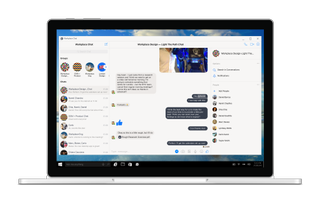Why bots are the future of Facebook's enterprise platform
Workplace customers want less collaboration and more automation

Artificial intelligence is one of the biggest buzzwords in the business world right now, with scores of companies rushing to take advantage of advances in machine learning and neural networks.
Facebook is one such company, and the social network has invested a great deal of time and energy into building support for chatbots and AI tools into platforms like Facebook Messenger.
It has also extended these functionalities to Workplace, its enterprise collaboration platform that now has 30,000 customers.
At MWC in Barcelona, Julien Cordoniou, Facebook's vice president for Workplace, told IT Pro that artificial intelligence and bots are key to the tool's future.
"The move from collaboration to automation is a pattern we see across every company, every industry and all of our customers," he said. "Turning Workplace from being a collaboration platform into an automation platform is what we define as next-generation IT."
According to Cordoniou, Workplace customers like Norwegian retailer Elkjop are changing the way they use the platform, making use of Workplace's bot support to automate tasks like inventory management and shift management.
"I think it's extremely important. If artificial intelligence can be used to automate some of the repetitive tasks that you don't necessarily want to be doing, or that you don't want your employees to do, I think it's a big win for the company. And that's typically the kind of thing that drives employee happiness, employee sentiment and hopefully employee retention."
Get the ITPro. daily newsletter
Receive our latest news, industry updates, featured resources and more. Sign up today to receive our FREE report on AI cyber crime & security - newly updated for 2024.
Amazon is also making a big effort to work AI into its commercial offerings, launching Alexa for Business as a way to let customers use voice-activated AI for practical tasks like booking meetings.
Most customers, Cordoniou said, are still buying Workplace as a collaboration tool, in an effort to reduce the distance between head office and frontline staff. The product has been particularly successful in the retail and manufacturing sectors, where workers on production lines or shop floors don't have a desktop device with which to access traditional intranets or enterprise messaging tools.
Danone, for example, has 80,000 workers, half of whom are factory workers who have never had a company laptop - but they do all have mobile phones. This also applies to Walmart's 2.5 million staff, who also use Workplace to communicate.
However, he told IT Pro that he thinks this is changing, and that bots and other solutions will soon be as big a driver as Workplace's collaboration tools. "In a few years, people will buy Workplace for the network and the communication platform that it is, but they will also buy Workplace for the quality and the diversity of the applications that they will find on top of the platform," he said.
"It's certainly a conversation we have with every customer, and this is also where we want to take them to. We don't just want to be a communication platform, we want to be the platform where you go to do your job, to get the job done - and that goes with automation."
Facebook is also committed to building a platform rather than a product with Workplace. Rather than attempting to be a one-stop shop, Cordoniou said, Facebook's strategy is to partner with best-of-breed companies like Box, Okta, Microsoft, Google and others.
This, he said, allows customers the specifically tailor workplace to their needs, or even to build their own solutions of top of it using tools like AI. "We don't want to build everything ourselves. We know very well what we do well and what we don't do well," he said. "For me, it's a partnerships play."
Adam Shepherd has been a technology journalist since 2015, covering everything from cloud storage and security, to smartphones and servers. Over the course of his career, he’s seen the spread of 5G, the growing ubiquity of wireless devices, and the start of the connected revolution. He’s also been to more trade shows and technology conferences than he cares to count.
Adam is an avid follower of the latest hardware innovations, and he is never happier than when tinkering with complex network configurations, or exploring a new Linux distro. He was also previously a co-host on the ITPro Podcast, where he was often found ranting about his love of strange gadgets, his disdain for Windows Mobile, and everything in between.
You can find Adam tweeting about enterprise technology (or more often bad jokes) @AdamShepherUK.





